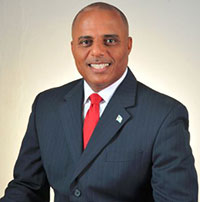|

|
 |
|
Last Updated: Apr 30, 2018 - 4:23:28 PM |
 NASSAU, The Bahamas – Minister of National Security the Hon. Marvin Dames, noted, on April 25, 2018, that the Interception of Communications Act of 1969, applicable to old technologies, was limited to only antiquated forms of communication. NASSAU, The Bahamas – Minister of National Security the Hon. Marvin Dames, noted, on April 25, 2018, that the Interception of Communications Act of 1969, applicable to old technologies, was limited to only antiquated forms of communication.
“Therefore, the Interception of Communication Bill 2017 needs to be passed to provide for the legal interception of email and other forms of communication over the internet, and other technological devices,” Minister Dames said, while giving his contribution to the Interception of Communications Bill 2017, in the House of Assembly.
“Without the enactment of this new Bill, law enforcement personnel will not be able to utilise the latest in law enforcement techniques and equipment to match the reach, resources or sophistication of organised criminal groups,” he added. “This will undoubtedly lead to a major regression in all of the gains made by law enforcement in recent times thereby exposing our beautiful nation to untold risks such as economic, reputational, and damage to our social fabric.
“These are risks that we cannot afford to take if we are committed to building a nation that is respected and focused on securing a future for successive generations.”
Minister Dames pointed out that, in a 2013 ABC News online article titled, “NSA: 'Over 50' Terror Plots Foiled by Data Dragnets”, former Director of the National Security Administration, General Keith Alexander, told the House Permanent Select Committee on Intelligence that more than 50 potential terrorist attacks on U.S. soil were stopped due to vast swaths of telephone metadata and Internet data collected daily by the NSA since 9/11.
In the same article, Minister Dames continued, former FBI Deputy Director, Sean Joyce, said in his testimony before the Panel that in 2009, using Section 702 authority of the Foreign Intelligence Surveillance Act granted to intercept communication, federal authorities intercepted an email from a terrorist located in Pakistan who was corresponding with an individual in Denver, Colorado.
The Minister said, acting on the information intercepted through the emails, the authorities identified the suspected terrorist and tracked him to New York City, where they executed search warrants and found bomb-making components. The suspect was arrested and later confessed to a plot to bomb the New York Subway System.
Minister Dames admonished that The Bahamas could not allow any incidents of that nature to occur.
“As a responsible Government, we have an obligation to the people of this nation to enact legislation – such as the one we are debating here today – that will provide law enforcement with the necessary tools to stay ahead of those hell-bent on destroying our nation in the name of greed and selfishness,” he stated. “We cannot and should not send the message to the criminal element that we are not prepared to follow them or match their resources to wherever they go to safeguard our nation’s security interests.”
“This would be a catastrophic error, resulting in devastating consequences for our little nation,” he added. “Are we prepared to surrender or risk it all for those with their hidden agendas? Or are we prepared and committed to protecting, the reputational and national security interests of our nation? The only way we make the latter possible is if we put systems in place to circumvent terrorist activity.”
Minister Dames stressed that he was in no way suggesting that terrorist attacks would ever occur “on our shores”; but what he would like to emphasise was that organised criminals and terrorists, for example, do not have to live or work in The Bahamas to compromise or wreak havoc on the society's way of life.
He noted that the rise of new information communications technologies in the last decade of the 20th century have continued into the 21st century, and The Bahamas, like many countries around the world, has been plagued by cyber crimes related to new technologies.
“The activities of communications technologies is one of the biggest challenges in the 21st century,” Minister Dames said. “Its global impact is felt in every corner of the earth from mega-corporations to everyday citizens. Crimes related to communications technologies at its bare minimum includes damage and destruction of data, stolen money, theft of personal and financial data, embezzlement, fraud, forensic investigation, deletion of hacked data software, and reputational harm.”
Minister Dames said that globally, it was estimated that cyber crimes costs approximately $600 billion dollars annually. He pointed out that it has become the fastest growing trans-national crime that is continuously increasing in scope, sophistication, and cost.
“To date, it is considered more profitable than the global illegal trade of all drugs combined,” Minister Dames said. “Specifically, for The Bahamas, the financial sector being our second major industry means that the threats of financial crimes due to technologies have placed a great burden on our safety and security as we aim to foster an economically safe and competitive industry. By 2020 it is expected that 80 percent of all countries will have cyber-crime policies and it is expected that 30 percent will have Cabinet or government level positions solely focused on cyber-crimes.”
Minister Dames stated that “the time for us to act is now.”
“If we do nothing then we increase the probability of an attack and by the time we come to that realization, ‘that wow, we may have made a mistake and we should have been proactive’, then it is too late,” he said. “As legislators, we must put law enforcement in a positive position to make our people less vulnerable and exposed to risks that emanate from far beyond the shores of The Bahamas.”

© Copyright 2018 by thebahamasweekly.com
Top of Page
|
|
 |

|
